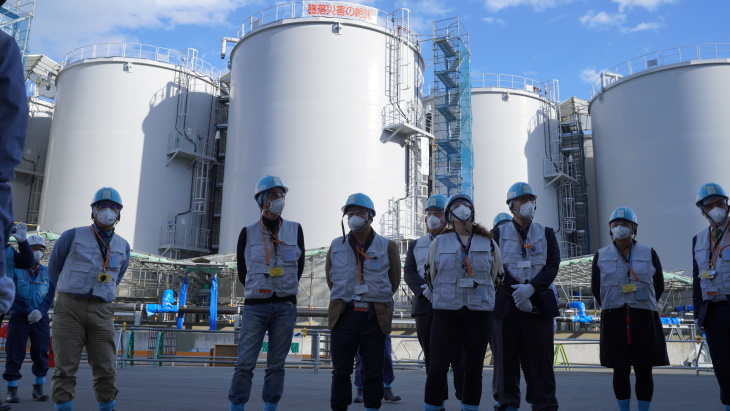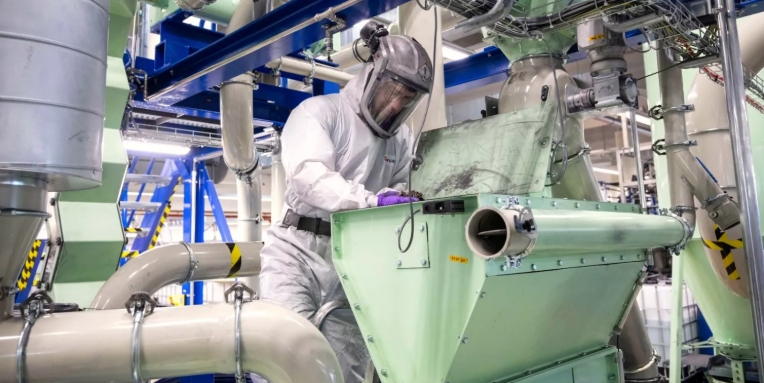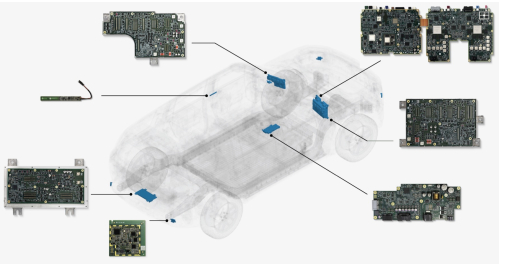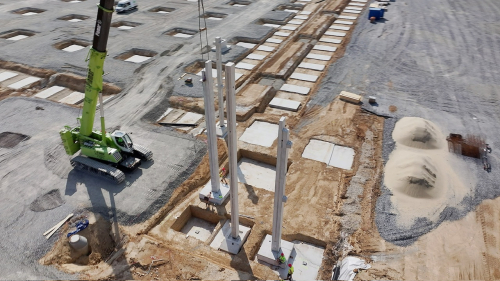An International Atomic Energy Agency (IAEA) task force reviewing the safety of Japan's plan to discharge treated water from the damaged Fukushima Daiichi nuclear power plant into the sea has released its fourth report. The report compiles the findings from the task force's second safety review mission to Japan, held in November 2022.

The IAEA task force inspected tanks of treated water at the Fukushima Daiichi site in November (Image: Tepco)
At the Fukushima Daiichi site, contaminated water - in part used to cool melted nuclear fuel - is treated by the ALPS system, which removes most of the radioactive contamination, with the exception of tritium. This treated water is currently stored in about 1000 tanks on site. The total tank storage capacity amounts to about 1.37 million cubic metres and all the tanks are expected to reach full capacity in mid to late 2023.
Japan announced in April 2021 it planned to discharge treated water stored at the Fukushima Daiichi plant into the sea over a period of about 30 years, and asked the IAEA to review its plans against IAEA safety standards.
The task force conducted a mission on 14-18 November last year, during which it met with plant owner Tokyo Electric Power Company (Tepco) and Japan's Ministry of Economy, Trade and Industry (METI) in Tokyo. It also visited the Fukushima Daiichi plant to review the progress made in the design and construction of equipment and facilities for the discharge, including the tunnel that is being built to transport the treated water one kilometre out to sea.
Its latest report assesses Tepco's technical responsibilities, including the safety-related aspects of the systems built to discharge the ALPS treated water, the radiological environmental impact assessment, source and environmental monitoring programmes, and occupational radiation protection.
The report says Tepco has taken account of the issues raised during the previous technical mission in February 2022 and has made significant progress to update its plans in accordance with feedback from the task force. It says any additional revisions made since the November 2022 mission will be assessed as part of the ongoing safety review after they are finalised and also approved by Japan's Nuclear Regulation Authority.
The task force said it would need to finalise the full safety review of the planned water discharge - encompassing technical, regulatory, and independent sampling and analysis aspects - before concluding whether Tepco had addressed the fundamental safety principles.
"The task force was satisfied that our observations were considered and reflected in revisions to key documents such as the Radiological Environmental Impact Assessment," said Gustavo Caruso, Director and Coordinator for the ALPS Safety Review, IAEA Department of Nuclear Safety and Security and chair of the task force.
The task force's safety review continues. Two more reports will be released - on regulatory and independent sampling and analysis aspects - before a comprehensive report detailing the collected findings and conclusions of the task force across all aspects of the review is issued later this year.
"No further missions to Tepco and METI are needed prior to the issuance of the IAEA's comprehensive report," the report noted. "Remaining clarification or follow up will be handled through electronic communication".
In response to the latest report, Tepco said it "will continue to make absolutely sure that it guarantees safety when handling ALPS treated water by subjecting its initiatives to IAEA reviews that compare them to international safety standards, while providing information to parties both in Japan and overseas in a highly transparent manner".







